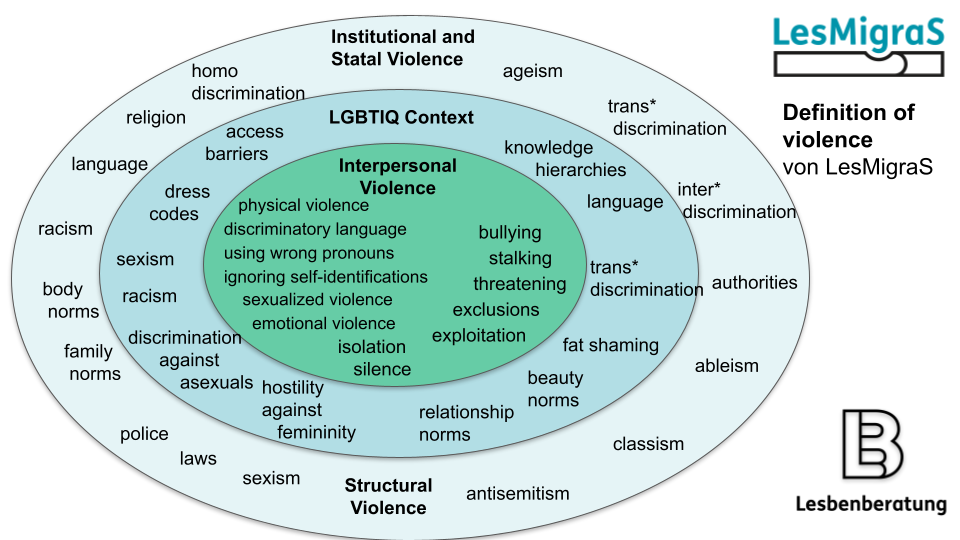Information
What is violence?
Our understanding of violence
Violence can take different forms and does not only start with a physical injury. There is physical, psychological, economic, verbal and sexual violence. If you are discriminated against, your identity is devalued, you are harassed or threatened, these are forms of violence. Violence can hurt you, limit you, make you feel insecure, leave psychological scars and have an impact on your health and finances.
more...
We counsel people who experience homophobia, trans* discrimination and racism. Some also experience violence/discrimination because of an impairment, their age, their origin or because they have no or little money. Often, the multiple discriminations and experiences of violence occur in combinations.
Violence can be perpetrated by individuals, but also by authorities and other institutions, such as schools or hospitals. Structural violence means that you recieve limited or no access to the cultural, social and economic resources of society. For example, if you are in a wheelchair and there is no barrier-free access to a building that could be considered structural violence because structures are in place that limits accessibility.
Lesbians, bisexual women, trans*, inter*, non-binary and queer people may experience interpersonal violence and discrimination on the street, at work or in their family of origin. Thus, people also experience violence in organisations of and for lesbian, gay, bisexual, trans*, inter*, non-binary and queer people, in friendships and in relationships.
Structural violence is perpetrated by state officals and laws. For example, people experience violence at the hands of police officers when their personal details are checked without reason, the police use massive physical violence during operations or treat some people, for example people of colour and/or trans*, as criminals.
We speak of structural violence when seemingly neutral regulations or criteria are used to disadvantage individuals or social groups. If only heterosexual people are portrayed in TV series and no lesbians, bisexual or gay people appear, then this is an example of structural homodiscrimination.
The Transsexual Act (TSG, German: “Transsexuellengesetz”) is an example of violence caused by legal regulations. Trans* people who want to take advantage of medical and legal options for gender reassignment are labelled as mentally ill and forced to undergo psychological assessments.
We consider any form of Racism, Sexism, Ableism (discrimination based on disability/impairment), Ageism, Classism (discrimination based on social status), homo- and trans* discrimination as violence.
What is Multiple Discrimination?
Lesbian, bisexual, gay, trans*, inter*, non-binary and queer people experience discrimination not only because of their sexual orientation or gender.
more...
Lesbian, bisexual, gay, trans*, inter*, non-binary and queer people are often affected by multiple discriminations such as Racism, Sexism, Ableism (discrimination based on disability/impairment), Ageism, Classism (discrimination based on social status), homophobia and trans* discrimination.
Here is an example: A woman of colour is not taken seriously by the police after a car accident and is harassed with jokes. She assumes that it is because of her accent, her androgynous appearance and the rainbow sticker on her car. Here, several relations of discrimination such as racism, homophobia and (hetero)sexism interweave. They cannot be separated from each other and take place on several levels. The violence is composed of racist devaluation and homophobic and sexist prejudices. This denies lesbianism as a self-determined way of life and does not take it seriously. This specific discrimination is called multiple discrimination.
It can take different forms, such as:
- Physical and Psychological violence: insults, harassment, threats, devaluation, or belittling.
- Exclusion or restricted access to education, the labour market, housing, health care, rights.
- Exclusion or restricted access to political and cultural activities
- Exclusion from literature, educational materials or media
- Exclusively stereotypical, derogatory portrayal in media
Our aim is to work against all forms of violence and discrimination. We find it important to include in anti-discrimination work the different experiences of discrimination of Lesbian, Bisexual, Gay, Trans*, Inter*, Non-Binary and Queer people. such as racism, classism, ageism, rejectionism, etc. We want people to have the opportunity to live their lives authentically.
Identity does not know an either-or.


